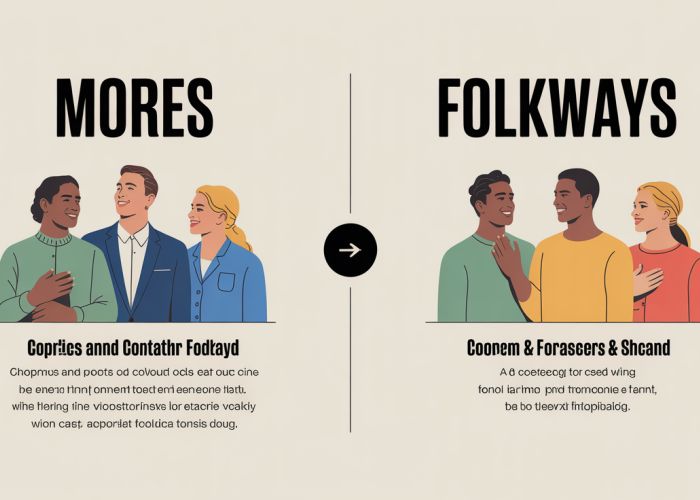Social norms, often discussed in the context of sociology, govern behavior within a society. Understanding these norms requires distinguishing between *mores* and *folkways*. The distinction between more vs folkway influences how we understand concepts like deviance and even the effectiveness of community regulations. Exploring more vs folkway therefore offers critical insights into the nuances of acceptable and unacceptable actions within any society.

More vs. Folkway: Unveiling the Fundamental Difference
Understanding the difference between mores and folkways is crucial for grasping how societies function and maintain order. While both are types of social norms, they carry vastly different weight and consequences. This article clarifies the subtle yet significant distinctions between "more vs. folkway."
Defining Folkways
Folkways are the customary, habitual ways people do things. They are the everyday conventions we follow without much conscious thought. They represent preferred, but not mandatory, behaviors.
Characteristics of Folkways
- Informal: Folkways are largely unwritten and unspoken.
- Flexible: They are adaptable to different contexts and can change over time.
- Mild Sanctions: Violations typically result in minor social disapproval or ridicule.
- Focus on Etiquette: Folkways often relate to matters of politeness and social grace.
Examples of Folkways
- Saying "please" and "thank you."
- Following dress codes (e.g., wearing appropriate attire for a particular occasion).
- Chewing with your mouth closed.
- Queuing or lining up in an orderly fashion.
Defining Mores
Mores (pronounced "mor-ays") are norms that are widely observed and carry significant moral weight. They represent the essential or characteristic customs and conventions of a community. Violating mores is considered a serious offense against societal values.
Characteristics of Mores
- Moral Significance: Mores are deeply rooted in ethical principles and beliefs.
- Stricter Enforcement: Violations result in strong social sanctions, including disapproval, ostracism, and even legal penalties.
- Defend Core Values: Mores protect fundamental societal values such as honesty, respect for life, and family stability.
- Less Flexible: They tend to be more rigid and resistant to change than folkways.
Examples of Mores
- Abstaining from theft, fraud, and violence.
- Practicing fidelity in marriage.
- Obeying the law.
- Respecting the sanctity of human life.
The Key Difference: Moral Significance and Consequences
The primary differentiator between "more vs. folkway" lies in their moral significance and the severity of the consequences for violation.
- Folkways: Violating a folkway is generally considered rude or inappropriate, but not immoral. The consequences are usually mild, such as a disapproving glance or a whispered comment.
- Mores: Violating a more is viewed as a threat to the social order and is considered morally wrong. The consequences can be severe, ranging from social exclusion to imprisonment.
Consider this table summarizing the main differences:
| Feature | Folkways | Mores |
|---|---|---|
| Moral Weight | Low; related to etiquette and custom | High; related to morality and ethics |
| Sanctions | Mild disapproval, ridicule | Strong disapproval, ostracism, legal penalties |
| Importance | Preferences; "should" behaviors | Essentials; "must" behaviors |
| Flexibility | More flexible and adaptable | Less flexible and resistant to change |
| Impact on Society | Less disruptive to social order when violated | More disruptive to social order when violated |
Understanding the Interplay
While distinct, mores and folkways are interconnected. Over time, some folkways can evolve into mores if they become strongly associated with deeply held values. Conversely, mores can lose their moral significance and become folkways as society changes. The line between "more vs. folkway" is not always absolute and can shift depending on cultural context and historical period.
More vs. Folkway: Frequently Asked Questions
Here are some common questions about the differences between mores and folkways, clarifying what makes them unique societal norms.
What’s the main distinction between a more and a folkway?
The key difference lies in the severity of the consequence for violation. Folkways are norms whose violation is met with mild disapproval. Mores, on the other hand, are norms whose violation threatens societal values and brings serious retribution.
Can you give a simple example of a more violation versus a folkway violation?
Sure. An example of a folkway violation might be eating with your hands at a formal dinner party. A more violation would be something like stealing, which directly harms others and undermines societal trust. See the difference? The more carries a much heavier consequence.
Are mores and folkways static, or can they change over time?
They are definitely not static! Both mores and folkways evolve over time with societal changes. What was once considered a more violation might become a folkway violation, or vice versa, as societal values shift. The interpretation of more vs folkway can be different among different cultures.
If both mores and folkways are types of norms, why is it important to understand the difference?
Understanding the distinction between more vs folkway is crucial for navigating social interactions and avoiding unintentionally causing offense. It highlights which behaviors are considered simply impolite and which are considered genuinely harmful to societal well-being, and will help you be more aware of your impact.
So, next time you’re thinking about societal rules, remember the difference between more vs folkway! Hopefully, you found this helpful. Until next time!